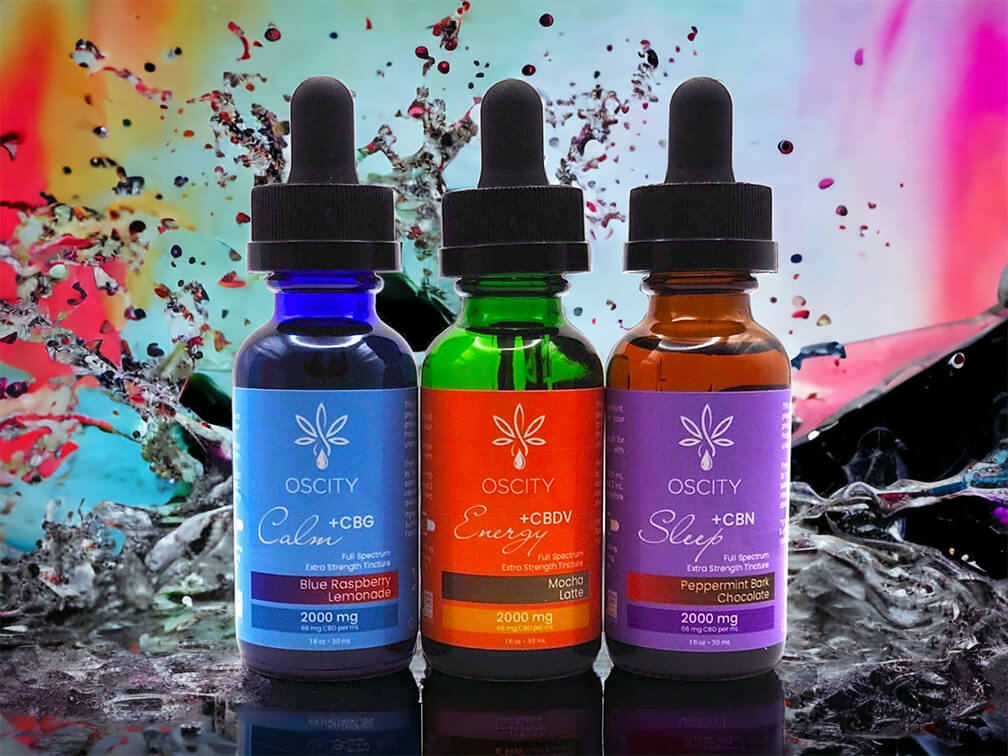What is Better Melatonin or CBD Oil for Sleep
Why CBD Is Better Than Melatonin When It Comes to Getting a Good Night’s Sleep
A good night's sleep is essential for your overall health and wellness and can also help bolster your immunity.
According to the Centers for Disease Control and Prevention, adults 18 or older should get seven to nine hours of sleep each night.
But that's not what's happening. 49% of adults in the U.S. reported they regularly get less sleep than required.
With the mounting adverse effects of not getting enough sleep, we all gravitate towards substances that can help us sleep better.
Now, over-the-counter (OTC) sleep aids and their natural alternatives, such as melatonin and CBD oil for sleep, are all the rage for sleep-deprived Americans.
Melatonin and CBD oil for sleep are often touted as the be-all and end-all cure for insomnia.
But when melatonin and CBD oil for insomnia are pitted against each other, which is the better contender?
To get the best possible results with either supplement, you must determine what's causing your sleep issues.
If your sleep troubles result from your body being out of sync with your sleep-wake cycle, as with jetlag, melatonin may be your best option.
But, if your sleep troubles are more deeply rooted and result from anxiety or stress, CBD may be your best bet.
This article will explore melatonin and CBD oil for sleep to explain which is best suited to solve sleep troubles.
We'll also take a closer look at CBD to see how it works to aid sleep and if other cannabinoids, such as CBN, can improve its functioning.
Do Melatonin and CBD Promote Sleep?

Your lack of proper sleep can stem from different conditions and circumstances, including
- Stress and anxiety. Constantly worrying about your health, work, school, and family can keep your mind racing all night long.
- Mental health conditions such as schizophrenia and depression
- Lifestyle factors such as work shifts and jet lag
- Poor sleeping environments, such as light, noise, and an uncomfortable bed
Here's how melatonin and CBD can help you sleep better.
Melatonin for Sleep

Melatonin is a hormone your brain produces as it gets dark.
It helps with your circadian rhythms (sleep-wake cycle) and can improve sleep by reducing the time it takes to fall asleep. Melatonin can also induce sleepiness.
Melatonin supplements can be made synthetically, from microorganisms or from animals.
These supplements are believed to work akin to body-produced melatonin to help you sleep better.
Research has shown that melatonin dietary supplements are best suited for people whose sleep disorders are rooted in sleep-wake cycle disorders, jetlag, and work shift changes.
Yet, more research is still needed to understand how melatonin works fully.
The dietary supplement may only be beneficial to people whose sleep disorder results from low melatonin levels in the body.
CBD Oil for Sleep

CBD boasts a lot of health and wellness benefits. For one, it has neuroprotective, anti-inflammatory, anti-anxiety, and pain-relieving properties.
Research into whether CBD supports better sleep has yielded promising results.
In one clinical trial, 33 patients with Parkinson's disease and sleep disorders were given CBD for a few weeks. At the end of the trials, the patients reported getting better sleep.
In other research focused on people with schizophrenia, anxiety, and epilepsy, 79% of the participants reported improved sleep after taking CBD supplements.
A 2019 review of different studies into CBD oil for sleep concluded that CBD could improve sleep by decreasing the time it takes to fall asleep and reducing disturbances during sleep.
CBD vs. Melatonin: Which Is Better for Sleep?
Melatonin will only solve your sleep disorders if it stems from low levels of the hormone in the body.
On the other hand, CBD helps you sleep better if your sleep disorder stems from multiple conditions.
For example, research has shown that CBD may improve sleep for people with depression, anxiety, epilepsy, schizophrenia, and Parkinson's.
Notably, since both CBD and melatonin are available OTC, it's possible to overuse them. Always consult your doctor before taking any supplements, as they may be best suited to advise on dosing and potential drug interactions.
Pros of Using Melatonin for Sleep
The most prominent advantage of melatonin is its ability to reduce the time it takes you to fall asleep.
Also, melatonin may have additional health benefits, including soothing seasonal depression and promoting eye health.
Cons of Using Melatonin for Sleep
Melatonin will only solve your sleep disorder if it occurs due to the low production of melatonin in the body.
While melatonin supplements are generally safe, taking them during the day can lead to daytime sleepiness and fatigue.
Also, melatonin can interfere with certain medications, such as diabetic medication, anticoagulants, and contraceptives.
Additionally, you are likely to develop some mild side effects while using melatonin. This can include:
- Drowsiness
- Nausea
- Dizziness
- Headaches
Other severe but less common side effects associated with melatonin use include:
- Increased risk of falls
- Diarrhea
- Short term depression
- Increased risk of seizures
- disorientation
Pros of Using CBD Oil for Sleep
Much research supports CBD's ability to help soothe stress and anxiety, elevate mood, and relieve inflammation. Getting restful sleep becomes much easier when you feel comfortable and relaxed.
Also, unlike melatonin, CBD is not linked to severe side effects.
Cons of Using CBD for Sleep
The only drawback to using CBD oil for sleeping is that, like many drugs, it's broken down in the liver.
This means CBD can interact with certain medications and prevent their breakdown.
If you're taking other prescription medications, talk to your doctor about potential drug interactions before taking CBD oil for sleep.
How CBD Works to Aid Sleep and Can CBN Make It Better?

CBD works with different mechanisms to regulate sleep and promote other health benefits.
Emerging evidence suggests that CBD may prevent body-produced cannabinoids (endocannabinoids) from breaking down. This helps the endocannabinoids stay in the body longer to promote homeostasis or balance.
CBD may also numb TRPV1 receptors, making us less vulnerable to pain. The TRPV1 receptor is a pain-sensing and heat receptor.
CBD can also bind with serotonin receptors to influence serotonin production. Serotonin regulates sleep, mood, sexual desire, nausea, and digestion.
On the other hand, CBN helps promote sleep by increasing the sedating effects of other cannabinoids.
Research into CBN has also found the cannabinoid to have similar effects to CBD. So it can promote sleep by alleviating underlying pain, anxiety, and inflammation.
Other theories also believe that CBD and CBN work so well because of the entourage effect—a phenomenon in which the combined power of cannabinoids leads to exponentially better health benefits than individual cannabinoids.
That said, finding products that harness the power of minor cannabinoids like CBN, CBG, and CBDV can be tricky.
Extracting these cannabinoids would require an elaborate process from cultivation to processing.
Oscity Labs' Best CBD Oil for Sleep
That's where Oscity labs come in. We are a fully integrated lab where we cultivate, process, and package plants.
We carefully select seeds based on their cannabinoid profiles. We target genetic strength in CBD, CBC, CBG, CBN, and CBDV.
Our extraction process aims at producing the purest form of isolates, cannabinoids, and distillates. Our base extracts test at 97% purity.
We focus on products that help with pain, anxiety, and sleep relief.
Our exclusive line for sleep relief includes CBD+CBN Sleep Tincture and CBD+CBN Sleep Gummies - Wildberry.
CBD Oil Dosage for Sleep, According to Research
Doctors and scientists still need to develop a defined CBD oil dosage for sleep.
Most clinical trials on the effects of CBD and sleep used varying doses of between 25mg and 1500 mg of CBD per day.
In a clinical trial to monitor sleep satisfaction, 33 people with Parkinson's disease were given 300mg of CBD daily. After a few weeks, all patients reported experiencing better sleep.
When trying to figure out the best CBD oil dosage for sleep, start with low doses and build your way up until you find an amount that works best for you.
Best CBD Oil for Sleep
Are you ready to harness the power of combined cannabinoids and reap exponential health benefits?
Oscity Labs has a line of products specifically designed to help you get a good night's sleep by harnessing the power of combining CBD and CBN.
1. CBD+CBN Sleep Tincture
CBD+CBN Sleep Tincture comes in 33 mg and 60mg to help you start with a lower dose and build your way up as needed.
The bottle has a dropper to help you conveniently deposit the peppermint bark chocolate-flavoured tincture under your tongue for quick relaxation.
With this sleep tincture, you'll harness the power of combining CBD, CBN, and botanical to chase away tension, and welcome relaxation, so you can wake up feeling delightfully refreshed.
2. CBD+CBN Sleep Gummies - Wild Berry

Are you looking for a decadent dessert that can also help you have an equally indulgent sleep? With CBD+CBN Sleep Gummies - Wildberry, you'll get 30 fruity gummies, each packing 25mg of CBD enhanced by CBN.
You’ll enjoy a delectable flavour and relaxing sleep with each bite. With as little as half a gummy, you're guaranteed to fall asleep faster and wake up feeling energized and rested.
Frequently Asked Questions
• Can You Take CBD and Melatonin Together?
It's medically safe to take melatonin and CBD together. Their combined effects are said to complement each other and produce better sleep. However, consult your doctor before taking any supplements.
• What Are the Side Effects of Melatonin?
Common side effects of melatonin include nausea, headaches, and dizziness. Less common side effects of melatonin include stomach cramps, diarrhea, short-term depression, and nightmares or vivid dreams.
• Are Melatonin and CBD the Same?
Melatonin is a hormone produced in the brain to help with the sleep-wake cycle. But CBD is a cannabinoid found in the cannabis plant and can be made in the body. It combines with serotonin receptors and can affect sleep, mood, appetite, and nausea.





